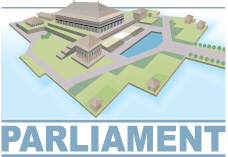Sunday Times 2
India: from policy paralysis to parliament paralysis
View(s):NEW DELHI (Reuters)- “Debate” is a word that doesn’t appeal much to Indian political leaders, at least when they are in parliament.áThe Comptroller and Auditor General’s (CAG) report on a suspected coal scam dubbed ‘Coalgate’ has been causing uproar in parliament for the past few days.
In a bid to drive political mileage from the report, the opposition has repeatedly stalled parliament, seeking the immediate resignation of Prime Minister Manmohan Singh.But, given the current economic scenario where extensive debate and passage of reforms is the need of the hour, parliamentary paralysis is only adding to India’s economic woes.
Perhaps in the golden years of India’s economy, when we were growing at 9 percent, such disruptions wouldn’t have raised as many eyebrows as they do today.
The various scams that surfaced over the recent years raise one common concern: loss to the exchequer, which is actually the common man’s loss. But the loss to the exchequer when parliament doesn’t function normally does not seem to cause discomfort.
Politicians might differ in their opinions and have a right to protest, but it should not be at the cost of disrupting the parliament. A media report (read here) reveals that the 15th Lok Sabha has lost 492 hours and 293 minutes in its ten sessions so far. It now needs 568 hours to finish legislative business lost to disruptions.
Some key bills are pending discussion, including the land acquisition bill and the banking laws amendment bill, which even led to a 2-day strike by bank staff this week.
When it comes to parliamentary activity, disruptions are a common sight in India. But it is time political leaders realise the economy needs to be pushed back on track with the speedy passage of reforms — something that will only happen when the parliament functions the way it should.
Rather than playing the blame game, stringent measures should be adopted soon to discourage politicians from doing this.
Perhaps their salaries and allowances should be incentivised and linked to their performance, just like it happens in the corporate world.
There have been politicians, including Varun Gandhi and Omar Abdullah, who have favoured the ‘no-work no-pay’ model. Though it is difficult to say whether such a model can fix things, it might just act as a deterrent.
Follow @timesonlinelk
comments powered by Disqus
















